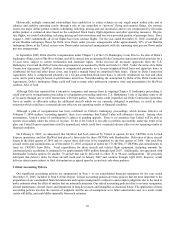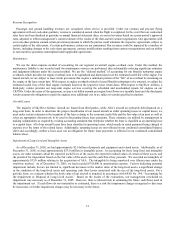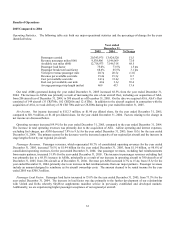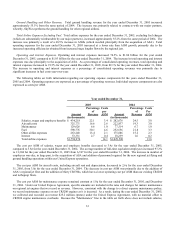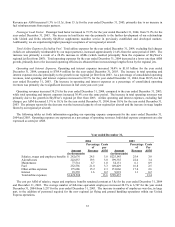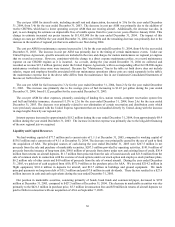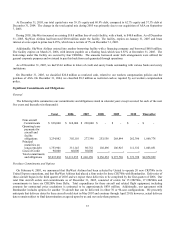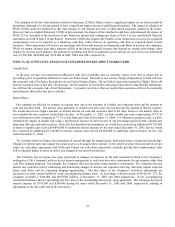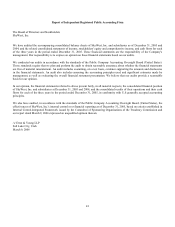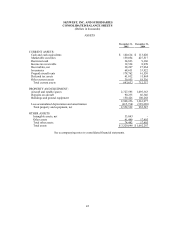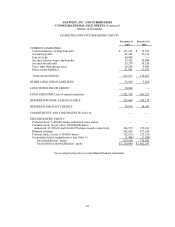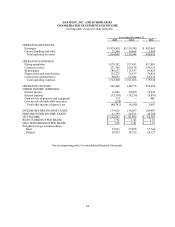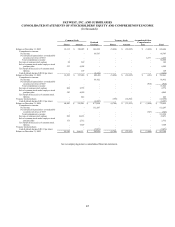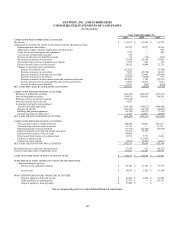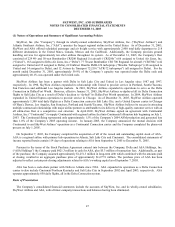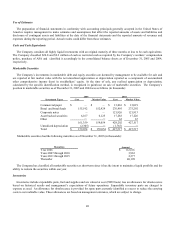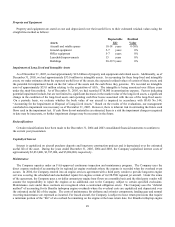SkyWest Airlines 2005 Annual Report Download - page 43
Download and view the complete annual report
Please find page 43 of the 2005 SkyWest Airlines annual report below. You can navigate through the pages in the report by either clicking on the pages listed below, or by using the keyword search tool below to find specific information within the annual report.39
The adoption of the fair value method set forth in Statement 123(R) is likely to have a significant impact on our future results of
operations, although it is not anticipated to have a significant impact on our overall financial position. The impact of adoption of
SFAS 123(R) cannot be predicted at this time because it will depend on levels of share-based payments granted in the future.
However, had we adopted Statement 123(R) in prior periods, the impact of that standard would have approximated the impact of
SFAS 123 as described in the disclosure of pro forma net income and earnings per share in Note 1 to our consolidated financial
statements set forth in Item 8 of this Report. Statement 123(R) also requires the benefits of tax deductions in excess of recognized
compensation cost to be reported as a financing cash flow, rather than as an operating cash flow as required under current
literature. This requirement will reduce net operating cash flows and increase net financing cash flows in periods after adoption.
While we cannot estimate what those amounts will be in the future (primarily because they depend on, among other things, when
employees exercise stock options), the amount of operating cash flows recognized in prior periods for such excess tax deductions
were $7,509,000, $442,000 and $129,000 in 2005, 2004, and 2003, respectively.
ITEM 7A. QUANTITATIVE AND QUALITATIVE DISCLOSURES ABOUT MARKET RISK
Aircraft Fuel
In the past, we have not experienced difficulties with fuel availability and we currently expect to be able to obtain fuel at
prevailing prices in quantities sufficient to meet our future needs. Pursuant to our contract flying arrangements, United will bear
the economic risk of fuel price fluctuations on our United Express flights. On our Delta Connection regional jet flights, Delta will
bear the economic risk of fuel price fluctuations. On the majority of our Delta Connection routes flown using Brasilia turboprops,
we will bear the economic risk of fuel fluctuations. At present, we believe that our results from operations will not be materially
and adversely affected by fuel price volatility.
Interest Rates
Our earnings are affected by changes in interest rates due to the amounts of variable rate long-term debt and the amount of
cash and securities held. The interest rates applicable to variable rate notes may rise and increase the amount of interest expense.
We would also receive higher amounts of interest income on cash and securities held at the time; however, the market value of
our available-for-sale securities would likely decline. At December 31, 2005, we had variable rate notes representing 74.7% of
our total long-term debt compared to 73.1% of our long-term debt at December 31, 2004. For illustrative purposes only, we have
estimated the impact of market risk using a hypothetical increase in interest rates of one percentage point for both variable rate
long-term debt and cash and securities. Based on this hypothetical assumption, we would have incurred an additional $6,701,000
in interest expense and received $4,895,000 in additional interest income for the year ended December 31, 2005 and we would
have incurred an additional $3,746,000 in interest expense and received $4,868,000 in additional interest income for the year
ended December 31, 2004.
We currently intend to finance the acquisition of aircraft through the manufacturer, third-party leases or long-term borrowings.
Changes in interest rates may impact the actual cost to us to acquire these aircraft. To the extent we place these aircraft in service
under our code-share agreements with Delta and United, our code-share agreements currently provide that reimbursement rates
will be adjusted higher or lower to reflect any changes in our aircraft rental rates.
The Company has an interest rate swap agreement to manage its exposure on the debt instrument related to the Company’s
headquarters. The Company's policies do not permit management to enter into derivative instruments for any purpose other than
cash flow hedging purposes. Accordingly, the Company does not speculate using derivative instruments. The Company assesses
interest rate cash flow risk by identifying and monitoring changes in interest rate exposures that may adversely impact expected
future cash flows and by evaluating hedging opportunities. The fair values of the Company's derivative instruments are
recognized as other current liabilities in the accompanying balance sheet. In accordance with provisions of SFAS No. 133, the
Company recorded a $344,000 and $691,000 liability at December 31, 2005 and 2004 respectively, in the accompanying
consolidated balance sheets representing the fair value of the outstanding interest rate swap agreement. The Company decreased
interest expense by $347,000 and $209,000 during the years ended December 31, 2005 and 2004, respectively, relating to
adjustments to the fair value and of the derivatives.



